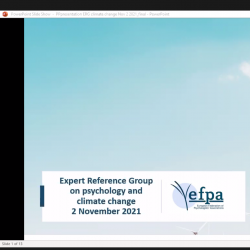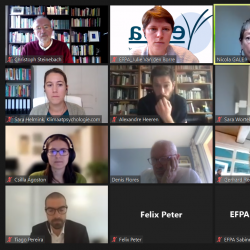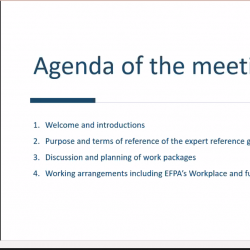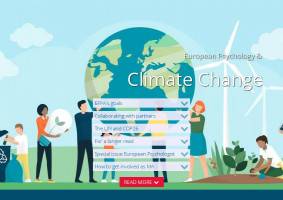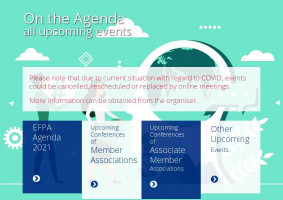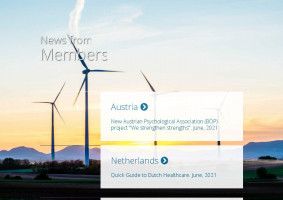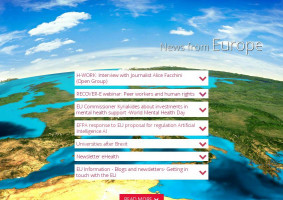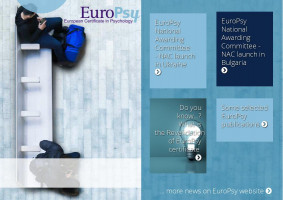READ MORE
In our EFPA Weather Map for European Psychology and Climate Change we set out what we will do during 2021-2023. In this edition we report on two developments:
First meeting of EFPA’s Expert Reference Group European Psychology and Climate Change.
We said we would:
Form a reference network of European experts with research track records and deep knowledge in psychology and climate change to ensure psychological evidence is at the heart of what we all do. (4.)
EFPA invited the Member Association nominees for our new expert reference group on psychology and climate change, which is a project group of EFPA, to an inaugural meeting on 2 November. At last count we have 24 people who have been put forward for this network which will be a fantastic resource.
In the Activity Agenda 2021-2023 we stated that an important wider piece of work is needed to compile:
• The psychological evidence that exists in relation to climate change to be used.
• The generic psychological evidence and models that are suitable to be applied to climate change but have not already been so applied.
This will be the main focus of the group’s work.
The group has started to think about how to go about this remit, considering systematic and umbrella reviews, green papers for targeted and more general circulation, and options for other tools at various stages of the work.
We are enormously grateful for the time and expertise that is being offered. If any MA has still to nominate and would wish to, please send your nomination to the EFPA Head Office.
We will report more news of the work of the group here as it happens.
Our Support Hub is now ready to be populated with your resources!
We said we would:
Develop an EFPA psychologists’ support hub to bring together resources from across Europe on psychology and climate change. (5)
The hub is designed to give a single point of access to psychology resources for psychologists to use in making our discipline and profession’s contribution to the global response to the threat of climate change. The resources aim to cover supporting individuals and families to change behaviour to live in a more sustainable way; communities to bring people together to make changes to tackle climate change and to cope with the effects of climate change on their communities; and resources to support psychology’s engagement with policy makers on climate change.
Links to the UNFCC (United Nations Framework Convention on Climate Change), COP26 (26th United Nations Climate Change Conference Of the Parties), and national government materials are also given.
We are looking for resources developed and approved by our MAs and affiliate / associate members particularly in the following areas:
- Individual sustainable behaviour
- Community action
- Influencing public policy
In the hub you will also find a developing library of resources from the UN and about COP26, as well as from wider partner organisations of EFPA.
Back to top
Global Psychology Alliance Climate Change Event
The Global Psychology Alliance (GPA), through the American Psychological Association, was accepted as an Observer Organisation to attend COP26, the United Nations (UN) climate change conference to be held in Glasgow, Scotland, from October 31st through November 13th, 2021.
The GPA proposes hosting a virtual conference currently tentatively titled, “Psychology in Action: Leading for the Climate” that specifically focuses on psychology and the climate crisis. The virtual conference will be held shortly after the completion of COP26. The “Psychology in Action” meeting will provide an opportunity for GPA leaders and members to both learn about proven environmental change programs based on psychological science and principles, as well as to gain practical advocacy knowledge and skills. These experiences will, ultimately, promote global efforts in psychology.
The “Psychology in Action” conference will take place almost two years to the day after the inaugural “International Summit on Psychology’s Contributions to Global Health” which was held in Lisbon, Portugal. The Summit, which led to the formation of the GPA, provided a sound basis for furthering plans on global leadership in psychology for an estimated 65 distinct psychological organisations, inclusive of an emphasis on the climate crisis.
The main topics to be covered are expected to be policy applications and evidence based change mechanisms.
Once the dates and details are confirmed the information will be posted to our Events page here.
Psychological Voices for the Planet’s Future: Surrounding Ourselves with Well-Being
Our friends in the Order of Psychologists Piedmont Italy are hosting this climate event on Friday 22 October. Given Italy are co-hosts with the United Kingdom of COP26, this psychology event is timely.
The organisers explain that the idea of the conference emerged from a simple, but fundamental question: Can Psychology help to mend the wounds of the Planet?
There is no simple response to this question, they say, but many other reflections follow. First, Psychology is not alone in this. Psychology must work with other disciplines such as Architecture, Biology, Engineering, Environmentalism, Meteorology, Oceanography, Philosophy and Political Science (to cite but a few) to develop an awareness of how human behaviour and habits have contributed to the destruction of the environment and to the climate crisis.
Second, Psychology can make a difference. It can play a forefront key role in integrating what other environmental sciences have clearly pointed out in suggesting that the climate crisis is reaching its peak, and catastrophic events around the world are showing irreversible damages.
Third, Psychology can specifically promote an understanding of our inner world: the way we think and feel about the planet, how we act for or against it, and how we structure, inhabit and transform our homes, cities, the countryside, the natural surrounding scenarios, and the world outside so as ‘to make them more habitable and liveable’.
Speakers from other disciplines include experts from cultural heritage and environment, biology, architecture, journalism, and Terri Morrissey, who is known to many of our readers from her work at the Lisbon psychologists’ climate summit in 2019 and as former CEO of the Psychological Society of Ireland. Nicola Gale EFPA Vice President is speaking on the theme of “Organising to deliver. European psychologists tackle climate change”.
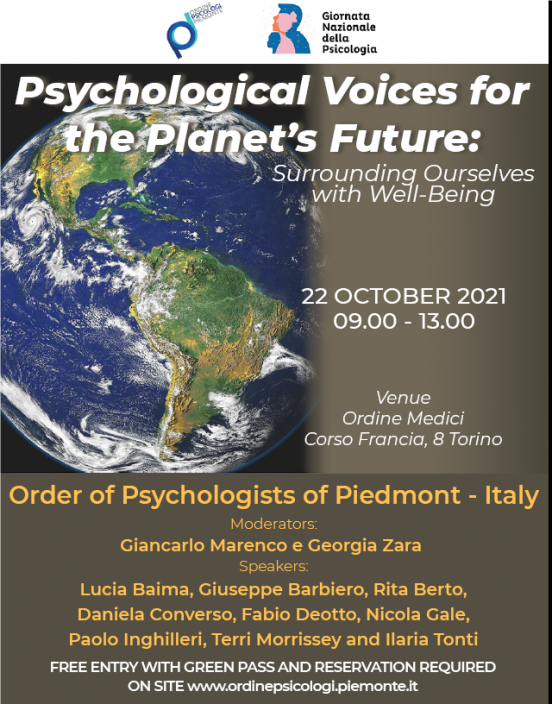
Download the event brochure (EN)
22 October - Psychology in dialogue with other disciplines for the future of the planet
Back to top
COP26 is only a fortnight away at time of writing. Here are some updates.
The programme for the politicians
UNFCCC has published an overview of proceedings
Voices of the peoples
Glasgow Science Centre is the official venue for the COP26 Green Zone.
The Green Zone is where the public, civil society, Indigenous Peoples, youth groups, charities, academics, artists and businesses can have their voices heard at COP26, through an extensive programme of events, workshops, talks and exhibitions that promote dialogue, awareness, education and commitments.
The programme of events is here
and did you know you can get a free ticket or watch events on YouTube?
Explainers
Glasgow Science Centre has produced a series of short explainer videos highlighting the purpose of COP26 and why it is a crucial opportunity to tackle climate change. These might help anyone trying to find out more or raise awareness as part of their role e.g. in teaching
From the hosts
Italy:
The Youth4Climate Summit took place in Milan from 28-30 September, for a summary see You can also look back at The #Youth4ClimateLive Series, hosted by the Italian Ministry for the Environment, Land and Sea, in collaboration with Connect4Climate – World Bank Group and the Office of the UN Secretary-General’s Envoy on Youth
The Series’ nine episodes covered a wide array of climate topics, with each session convening intergenerational discussions.
UK:
On 12 October the COP26 President-Designate Alok Sharma gave a speech in Paris, warning leaders that they must deliver in Glasgow, with the summit set to start on 31 October. Watch it on YouTube
Discover Glasgow
This UK national news piece gives some information on Glasgow, the city where COP26 is being held. More information
Back to top
-
The Crisis, Disaster and Trauma of Climate ChangeNoreen Tehrani, UK Representative, CD&T Standing Committee, EFPA
A survey of the crisis, disaster and trauma (CD&T) provisions of seventeen European countries undertaken by EFPA’s Crisis, Disaster and Trauma Standing Committee found the level of disaster preparedness for dealing with the immediate and long term psychological impact of disasters was under developed in many European countries. This has serious implications as throughout the continent where there are increasing crises and disasters created or exacerbated by climate change.
The EFPA survey found little evidence of any psychological input in disaster preparedness exercises or in assessing immediate and long term psychological impact and effectiveness of interventions. Reviews of international disaster provisions (Lucchini, Acquilla et al., 2017) shows preparation and responding to the psychological impact is often left to humanitarian and other non-governmental organisations rather than being integrated into a national or regional disaster response.
Read more
Whilst the full impact of COVID-19 on individuals, families, organisations, communities and nations may not yet be recognised, the pandemic has provided an opportunity for people to consider what matters in their lives. The environmental benefits of changing the way we live have been significant. People and organisations are becoming more receptive to opportunities to take action on climate change (George & Schillebeeckx, 2020).
A window of opportunity now exists to us to use psychological knowledge, skills and expertise to influence the development of environmental sustainability for the benefit of the people of Europe and beyond. Through the concerted efforts, developments and creativity of scientists, engineers, educationalists, biologists, humanitarians, geographers, architects, agriculturalists, medics, economists, politicians and others we can identify ways for climate hazards to be avoided, exposure reduced and resilience increased.
Within this mix of professions, psychologists have a role to play with their understanding of the working of the mind and how it directs and influences behaviour through the communication and re-enforcement of public health messages. Psychologists are trained to observe and understand human motivation, attitudes and actions as well as the skills to create environments that facilitate effective leadership, creativity and the capacity to address complex problems (Paton, 2018).
For people to respond to the prospect of disasters there is a need to understand the nature of the hazard and the harm it could cause, unfortunately, cognitive processes are biased leading to the development of states of unrealistic optimism (Weinstein, Lyon, 1999). This flawed thinking can cause people to believe:
- They are less likely than other people to be affected by a disaster
- If affected they will be able to handling the situation
- Their national/local governments can deal with the disaster without their help
The challenge for psychologists is how to raise community awareness of the dangers of a disaster without creating a level of fear which undermines their ability and willingness to respond (Hastings and Stead, 2004; Harries, 2008).Whilst, prevention of a global climate crisis should be our aim, within the CDT standing committee there is a recognition there will be many people within Europe affected by these crises and disasters who will need support. There is window of opportunity to prepare our communities with the resources, infrastructure, knowledge and skills to support victims of floods, fires, famine and disease. In addition there is a need to create trauma informed professionals (NHS Scotland, 2017) including teachers, social workers, emergency service workers and others able to provide psychological first aid (PHE, 2021) and other post disaster interventions (Richins et al. 2019).
During the past two years psychologists have been given unprecedented opportunities to influence governments, decision makers, organisations and communities through the rapid review of evidence and production of practical guidance (OECD, 2020). It is vital for psychologists to continue to work with other professions to recognise and reduce the hazards, identify and protect the vulnerable and to envision and promote more sustainable ways of living.
-
References
References George, G. Schillenbeeckx, S. Digital sustainability and its implications for finance and climate change,
Harries, T. (2008) Feeling secure or being secure? Why it can seem better not to protect yourself against a natural hazard, Health, Risk and Security, 10, 479-490
Hastings, G. Stead, M. (2004) Fear appeals in social marketing: strategic and ethical reasons for concern, Psychology & Marketing, 21 (11) 961-986
Lucchini RG, Hashim D, Acquilla S, et.al. (2017) A comparative assessment of major international disasters: the need for exposure assessment, systematic emergency preparedness, and lifetime health care. BMC Public Health. 7;17(1):46. doi: 10.1186/s12889-016-3939-3.
NHS Scotland (2017) Transforming Psychological Trauma: a knowledge and skills framework for the Scottish Workforce. nationaltraumatrainingframework-execsummary-web.pdf (scot.nhs.uk)
OECD (2020) COVID-19 and the low-carbon transition. Impacts and possible policy responses, COVID-19 and the low-carbon transition: Impacts and possible policy responses (oecd.org)
Paton, D. (2018) Disaster risk reduction: psychological perspectives on preparedness, Australian Journal of Psychology, 71, 327-341
PHE (2021) PHE launches new Psychological First Aid training, PHE launches new Psychological First Aid training - GOV.UK (www.gov.uk)
Richins, M.T, Gauntlett, L., Tehrani, N., Hesketh, I. Weston, D., Carter, H. Amlôt, R. (2019) Scoping Review: Early Post-Trauma Interventions in Organisations, Internal Document, Report delivered to British Psychological Society, College of Policing and Public Health England
Weinstein, N.D. Lyon, J.E. (1999) Mindset, optimistic bias about personal risk and health-protective behaviour, Health Psychology, 4 (4) 289-300
EIB Climate survey 2020-2021- the climate crisis in a COVID 19 world: calls for a green recovery
The third edition of the EIB Climate Survey shows that COVID-19 has changed people’s perception of the climate emergency. Most Europeans now consider the pandemic to be the greatest challenge facing their countries, but climate change remains a crucial issue.
Europeans say:
- the economic recovery from the crisis must address climate change
- governments should promote growth that emits less CO2 and makes societies more resilient to climate change
- modifying personal habits to address climate change is important
- technological innovation should be used to fix climate problems
- climate action and the transition to green economies must take into account social inequalities.
These findings are particularly important today because the climate and a green recovery are top priorities in the European Union and many other regions of the world. Read the latest survey to find out what people see as the most effective way to address the climate emergency, what people are willing to give up, what they expect from government policies, and how COVID-19 influences our views.
_w638_h898_1.png)
Special issue EP 'Psychology and the Environmental Crisis' now available
Guest editors: Tony Wainwright, Kateriina Salmela-Aro and Margarida Gaspar de Matos (PT).
In light of COP26 the issue is free access until the end of 2021.
See Katarina, Tony and Margarida commenting on the special edition and watch the video's on YouTube:
Katerina comments
Tony comments
Margarida comments in French
and Portuguese
Read more under EFPA's Recommended publications here
Back to top
EFPA’s News Magazine will be carrying regular stories about climate change over the next few editions. If you have a story and want to share the work of your association, please contact our editor via News@efpa.eu .
Back to top
